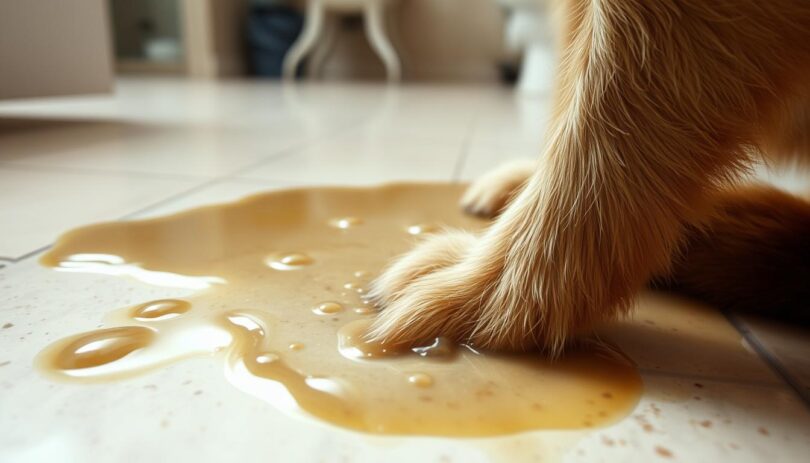Did you know 48% of veterinary visits involve gastrointestinal issues? While messy and unpleasant, loose stool in pets often signals deeper health concerns rather than being an illness itself. Recognizing this distinction helps owners respond effectively to their dog’s needs.
Canine diarrhea occurs when the digestive system fails to absorb water or nutrients properly. Veterinarians classify it into four types: osmotic (imbalanced gut fluids), secretory (excess fluid release), exudative (intestinal lining damage), and rapid transit (fast bowel movement). These categories help pinpoint triggers like dietary mistakes, infections, or toxins.
Common culprits range from eating spoiled food to parasites like whipworms. Stress, medications, or inflammatory bowel disease can also disrupt digestion. Blood in stool, vomiting, or lethargy require immediate vet attention—these may indicate parvovirus or kidney problems.
Monitoring your pet’s symptoms and diet provides critical clues. For example, a bland meal of white rice and chicken often resolves mild cases. However, persistent issues demand professional diagnosis to rule out severe conditions. This guide explores key reasons behind digestive upset, empowering owners to make informed decisions for their dog’s health.
Understanding Dog Diarrhea: Symptoms, Types, and Diagnosis
Canine digestive distress sends over 500,000 pets to clinics annually, with stool consistency offering vital clues about their health. Observing your companion's bowel movements helps distinguish temporary upsets from urgent medical needs.
Identifying the Signs of Diarrhea in Dogs
Loose or watery stools are primary indicators. Other symptoms include increased bathroom trips, straining, or accidents indoors. Track these details:
– Frequency: More than 5 episodes daily suggests severity
– Appearance: Mucus resembles slimy jelly coatings
– Color: Black stools may indicate internal bleeding
Types of Diarrhea and When It May Be Serious
Veterinarians categorize digestive issues into osmotic (poor nutrient absorption) and secretory (excess fluid release) types. Blood-streaked waste or vomiting paired with lethargy often signals parasites, infections, or inflammatory bowel disease. Puppies with fever require immediate care to rule out parvovirus.
How Vets Diagnose Underlying Causes
Clinics typically start with fecal exams to check for worms and lab tests to assess organ function. X-rays help detect foreign objects, while blood work identifies infections. For persistent cases, your vet might recommend dietary trials to pinpoint food sensitivities.
Most mild cases resolve within 48 hours. However, dehydration risks increase rapidly in small breeds—seek professional help if symptoms persist beyond two days.
What Causes Diarrhea in Dogs: Common Triggers and Underlying Issues
Nearly 40% of digestive issues in pets stem from preventable factors. Understanding these triggers helps owners reduce risks and respond appropriately when problems arise.
Dietary Indiscretion and Food-Related Causes
Scavenging behaviors often lead to trouble. Dogs may ingest spoiled food, trash, or toxic plants—common culprits behind sudden digestive upset. Even harmless-seeming table scraps like fatty meats can overwhelm their systems.
Abrupt diet switches disrupt gut bacteria balance. Transitioning between foods gradually over 5-7 days minimizes this risk. Some pets develop sensitivities to specific proteins or grains, requiring specialized meal plans.
Infections, Parasites, and Inflammatory Conditions
Pathogens like parvovirus attack intestinal linings, while bacteria such as salmonella trigger severe inflammation. Parasites including giardia and whipworms steal nutrients, often causing chronic loose stools.
Inflammatory bowel disease (IBD) creates persistent digestive turmoil. Unlike temporary upsets, IBD requires long-term management through medication and hypoallergenic diets. Learn more about common triggers of dog diarrhea.
Watch for patterns—recurring episodes despite dietary adjustments often signal deeper health concerns. Diagnostic tests help distinguish between simple indigestion and conditions needing targeted treatment.
Treating and Managing Diarrhea in Dogs: Home Remedies and Veterinary Care
Proper care during digestive upsets can prevent 60% of emergency vet visits. Most mild cases respond well to simple interventions, while others demand professional expertise. Knowing when to act at home versus seeking help ensures your pet recovers safely.
Home Treatments: Fasting, Bland Diets, and Probiotics
Start by withholding food for 12-24 hours to let the gut rest. Offer small amounts of water or ice cubes hourly to prevent dehydration. After fasting, introduce a bland meal—mix boiled chicken (no skin) with plain white rice or pumpkin.
Probiotics designed for pets help restore healthy gut bacteria. Gradually return to regular food over 3-4 days. Avoid rich treats or new ingredients during recovery.
When to Seek Immediate Veterinary Attention
Contact your vet if vomiting persists beyond 24 hours or stool contains blood. Sunken eyes, dry gums, or skin tenting signal severe dehydration requiring IV fluids. Never give human medications like Pepto-Bismol—some ingredients poison dogs.
Foreign object ingestion often causes sudden abdominal pain. Puppies with fever or lethargy need urgent testing for parvovirus. Chronic issues might indicate kidney problems or inflammatory bowel disease needing specialized care.
Closing Insights on Dog Diarrhea and Promoting Pet Health
Maintaining your dog’s digestive health requires awareness and timely action. Most cases stem from dietary missteps, infections, or stress, with symptoms like loose stools, fatigue, or blood in waste signaling the need for attention. Early intervention with fasting or bland meals often resolves mild issues, but worsening conditions demand veterinary expertise.
Regular check-ups help detect parasites or chronic conditions early. A balanced diet tailored to your pet’s needs reduces flare-ups, while avoiding table scraps minimizes risks. For ongoing care, explore effective home care strategies that complement professional advice.
Always monitor your companion’s recovery progress. Persistent vomiting, dehydration signs, or behavioral changes warrant immediate vet visits. Building a partnership with your veterinarian ensures personalized solutions for long-term wellness—because proactive care keeps tails wagging.
FAQ
How long does diarrhea typically last in dogs?
Mild cases often resolve within 24–48 hours with fasting and a bland diet like boiled chicken and white rice. Persistent diarrhea lasting over 48 hours or accompanied by vomiting or lethargy requires veterinary evaluation to rule out infections, parasites, or chronic conditions like inflammatory bowel disease.
Can certain human foods trigger diarrhea even if they’re safe for people?
Yes. Foods like dairy, fatty meats, or table scraps can upset a dog’s stomach. Chocolate, onions, and grapes are toxic and cause severe reactions. Always consult your vet before introducing new foods to avoid dietary indiscretion.
What parasites commonly lead to diarrhea in dogs?
Roundworms, hookworms, whipworms, and protozoans like Giardia are frequent culprits. Puppies are especially vulnerable. Vets diagnose these through fecal exams and may prescribe dewormers or antibiotics like metronidazole.










Leave a Comment